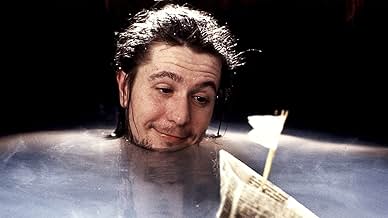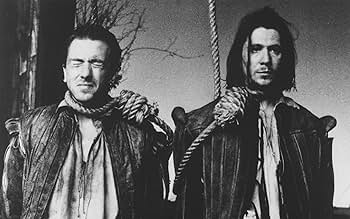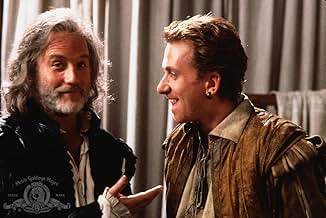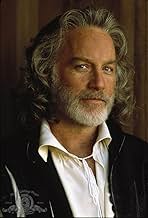Rosencrantz & Guildenstern sont morts
Original title: Rosencrantz & Guildenstern Are Dead
- 1990
- Tous publics
- 1h 57m
IMDb RATING
7.3/10
25K
YOUR RATING
Two minor characters from the play 'Hamlet' stumble around unaware of their scripted lives and unable to deviate from them.Two minor characters from the play 'Hamlet' stumble around unaware of their scripted lives and unable to deviate from them.Two minor characters from the play 'Hamlet' stumble around unaware of their scripted lives and unable to deviate from them.
- Awards
- 3 wins & 2 nominations total
Serge Soric
- Tragedian
- (as Srdjan Soric)
Sven Medvesek
- Laertes
- (as Sven Medvesck)
- Director
- Writer
- All cast & crew
- Production, box office & more at IMDbPro
Featured reviews
So I was sitting around watching TV on a Sunday afternoon... or
trying too, anyway. Tragically there was nothing on... until my eye
caught a title; Rosencrantz and Guildenstern Are Dead. My inner- geek answered "well duh. Read the play didn't I?" Of course my
inner geek is also curious as anything, so my geek and I turned
the channel sat back and watched as two befuddled, goofy
Shakespearian hooligans find themselves in Elsinor home of their
loony friend Hamlet. Now don't get me wrong, the dialogue goes
about 90 miles per hour, but the topics are Kevin Smith-like in their
randomness and the relationship between these two classic
characters also remind me of one Kevin would write. What's more the only way to know which is Rosencrantz and which
is Guildenstern is to look on the credits. Even they sometimes
aren't sure who's who. This movie is lightning fast and painfully
clever, definitely not for the faint of heart or head, but if you've got it
in you I *highly* recommend it.
trying too, anyway. Tragically there was nothing on... until my eye
caught a title; Rosencrantz and Guildenstern Are Dead. My inner- geek answered "well duh. Read the play didn't I?" Of course my
inner geek is also curious as anything, so my geek and I turned
the channel sat back and watched as two befuddled, goofy
Shakespearian hooligans find themselves in Elsinor home of their
loony friend Hamlet. Now don't get me wrong, the dialogue goes
about 90 miles per hour, but the topics are Kevin Smith-like in their
randomness and the relationship between these two classic
characters also remind me of one Kevin would write. What's more the only way to know which is Rosencrantz and which
is Guildenstern is to look on the credits. Even they sometimes
aren't sure who's who. This movie is lightning fast and painfully
clever, definitely not for the faint of heart or head, but if you've got it
in you I *highly* recommend it.
Okay, so you may want to brush up on your knowledge of "Hamlet" before viewing "Rosencrantz and Guildenstern Are Dead", Tom Stoppard's big screen adaptation of his own classic play. Please don't let that frighten you away, or you'll miss out on a seriously funny movie.
The lead roles are extremely well cast. Gary Oldman is hilarious as sweet, befuddled Rosencrantz. Tim Roth's angry, frustrated Guildenstern is the perfect complement. They make a great team.
Stoppard's film has a sprightly step even when raising a few cosmic questions. It's the perfect tonic for some of the more pompous cinematic takes on Shakespeare, and even the Bard would appreciate its sparkling wordplay.
The lead roles are extremely well cast. Gary Oldman is hilarious as sweet, befuddled Rosencrantz. Tim Roth's angry, frustrated Guildenstern is the perfect complement. They make a great team.
Stoppard's film has a sprightly step even when raising a few cosmic questions. It's the perfect tonic for some of the more pompous cinematic takes on Shakespeare, and even the Bard would appreciate its sparkling wordplay.
As an architect, I am often asked what is the world's best building. The answer: a small chapel outside Barcelona started by Gaudi but never finished. We have the model (a bunch of strings) and the basement. But when one visits, it is a profoundly lifechanging place. Gaudi exceeded the building's budget, and then that of the whole community (which was to have been built) before getting out of the ground. But the ambition was so grand, one can see it with only the barest explicit minimum. But, you have to have the reference of what the master intended.
Hamlet is the same. It was never really finished, being so large a conception. Shakespeare tinkered and added over decades. So what Stoppard does here is expand Hamlet by shrinking it. The plot is only glimpsed, but that part was always incidental anyway. The play is about reasoning, and when things are real and when not, and about what element of reality is causal. So instead of giving us the language, Stoppard seizes on one device, the play within the play.
In the raw Hamlet, this is pretty rich, but Stoppard weaves new dimensions of inversion and self-reference. There are at least four levels of play here, and we keep switching about, together with most of the characters. This is not just amusing, but elaborates on `Hamlet,' when is fate real? would it change if we could see the larger clockworks of the universe? does language (specifically query) aid in this endeavor? considering that, are ideas tied to time and fate? This last point is comically illustrated as one of the pair (they don't know who is who) keeps `stumbling' on great ideas, which then vanish.
The play (Stoppard's first) seems to have been his one excellent work, followed by the mundane. Some are unhappy because the film is not so frantic as the 1967 play, but I think that is because there is a different dynamic with a film audience than a stage audience. Fewer tricks can be played. But this is a wonderful solution to the problem of language in film: it is just not cinematic, so best to exploit the dissonance.
There's risk here. The film as film is not great, so set that aside. And the notions are dangerously sophomoric. But that's what makes the whole thing so darned funny. Some critics (notably the normally intelligent Stanley Kauffmann) think Roth and Oldham are poor. But this is a strange sort of acting demand, one for which no measures exist: part surreal, part comic (in different traditions, half Monty Python, half Abbot and Costello) and part tragic confusion. They reward my trust and that's what matters I think. Dreyfus is supposed to be over the top, and he complies.
In the great Hamlet sweepstakes, many recommend seeing Mel Gibson and then Gwyneth Paltrow. I suppose that's a colorful route. But the real sense of what this is all about comes through with more real reward via Branagh and then this clever film.
Hamlet is the same. It was never really finished, being so large a conception. Shakespeare tinkered and added over decades. So what Stoppard does here is expand Hamlet by shrinking it. The plot is only glimpsed, but that part was always incidental anyway. The play is about reasoning, and when things are real and when not, and about what element of reality is causal. So instead of giving us the language, Stoppard seizes on one device, the play within the play.
In the raw Hamlet, this is pretty rich, but Stoppard weaves new dimensions of inversion and self-reference. There are at least four levels of play here, and we keep switching about, together with most of the characters. This is not just amusing, but elaborates on `Hamlet,' when is fate real? would it change if we could see the larger clockworks of the universe? does language (specifically query) aid in this endeavor? considering that, are ideas tied to time and fate? This last point is comically illustrated as one of the pair (they don't know who is who) keeps `stumbling' on great ideas, which then vanish.
The play (Stoppard's first) seems to have been his one excellent work, followed by the mundane. Some are unhappy because the film is not so frantic as the 1967 play, but I think that is because there is a different dynamic with a film audience than a stage audience. Fewer tricks can be played. But this is a wonderful solution to the problem of language in film: it is just not cinematic, so best to exploit the dissonance.
There's risk here. The film as film is not great, so set that aside. And the notions are dangerously sophomoric. But that's what makes the whole thing so darned funny. Some critics (notably the normally intelligent Stanley Kauffmann) think Roth and Oldham are poor. But this is a strange sort of acting demand, one for which no measures exist: part surreal, part comic (in different traditions, half Monty Python, half Abbot and Costello) and part tragic confusion. They reward my trust and that's what matters I think. Dreyfus is supposed to be over the top, and he complies.
In the great Hamlet sweepstakes, many recommend seeing Mel Gibson and then Gwyneth Paltrow. I suppose that's a colorful route. But the real sense of what this is all about comes through with more real reward via Branagh and then this clever film.
Rosencrantz and Guildenstern Are Dead was one of my favourite films whilst growing up. The movie follows two irrelevant characters (irrelevant in that although they served a significant purpose, their characters were not developed in any depth... Rosencrantz and Guildenstern, as individuals, were relatively unimportant) through one of the most renowned stories ever told (Hamlet). It is a film about two characters that are completely unaware of the magnitude of the events taking place around them. This carries on throughout the entire film, and is also evidenced in their accidental discoveries of significant historical scientific findings (such as the steam engine or the concept of gravity). The characters stumble their way through the film, unaware of the consequences to their actions or their significance or importance.
The characters spend the entire film coming to terms with their existence. Shakespeare didn't provide any detailed character development of either Rosencrantz or Guildenstern, and as such, they are left confused as to the purpose of their own existence.
The film also looks at the concept of a predetermined destiny. Rosencrantz and Guildenstern's fate is already determined before the film begins. And although they play an important role in one of the greatest stories ever told, they are completely unaware of their destiny; they are merely victims of circumstance.
I should also note that the constant banter between the two characters (specifically in their 'Game of Questions') is pure quality.
The characters spend the entire film coming to terms with their existence. Shakespeare didn't provide any detailed character development of either Rosencrantz or Guildenstern, and as such, they are left confused as to the purpose of their own existence.
The film also looks at the concept of a predetermined destiny. Rosencrantz and Guildenstern's fate is already determined before the film begins. And although they play an important role in one of the greatest stories ever told, they are completely unaware of their destiny; they are merely victims of circumstance.
I should also note that the constant banter between the two characters (specifically in their 'Game of Questions') is pure quality.
This is a truly unique movie, comic, sarcastic, tragic, ironic, and definitely hilarious. based on tom stoppard's play of the same name (stoppard also directs the film), "rosencrantz and guildenstern are dead" delves into the tragicomic lives of minor characters everywhere, on-stage and off. ros and guild's lives are thrown into turmoil every time they interact with the regular cast of hamlet, leaving them with few clues as to what their purpose is in the play and in life. stoppard's script is dizzying with puns, plays, feints and twists. the cinematography is minimalist to say the least (remember, the script was originally intended for the stage) but the "stage-presence" of the actors more than makes up for any lacks. if you like theatre and the absurd, this movie is for you.
Did you know
- TriviaOriginally, the two leads (who appropriately spend the movie mixing up their own names) were cast the other way around.
- GoofsThroughout the movie there are scenes where day suddenly changes to night and vice versa. This is a running gag of Tom Stoppard plays which often have "time jumps" written into the stage directions.
- Quotes
Rosencrantz: Do you think Death could possibly be a boat?
Guildenstern: No, no, no... Death is "not." Death isn't. Take my meaning? Death is the ultimate negative. Not-being. You can't not be on a boat.
Rosencrantz: I've frequently not been on boats.
Guildenstern: No, no... What you've been is not on boats.
- ConnectionsEdited into Spisok korabley (2008)
- How long is Rosencrantz & Guildenstern Are Dead?Powered by Alexa
Details
- Release date
- Countries of origin
- Language
- Also known as
- Rosencrantz et Guildenstern sont morts
- Filming locations
- Production companies
- See more company credits at IMDbPro
Box office
- Gross US & Canada
- $739,104
- Opening weekend US & Canada
- $24,004
- Feb 10, 1991
- Gross worldwide
- $739,104
- Runtime1 hour 57 minutes
- Color
- Aspect ratio
- 1.85 : 1
Contribute to this page
Suggest an edit or add missing content

Top Gap
What is the Spanish language plot outline for Rosencrantz & Guildenstern sont morts (1990)?
Answer


























